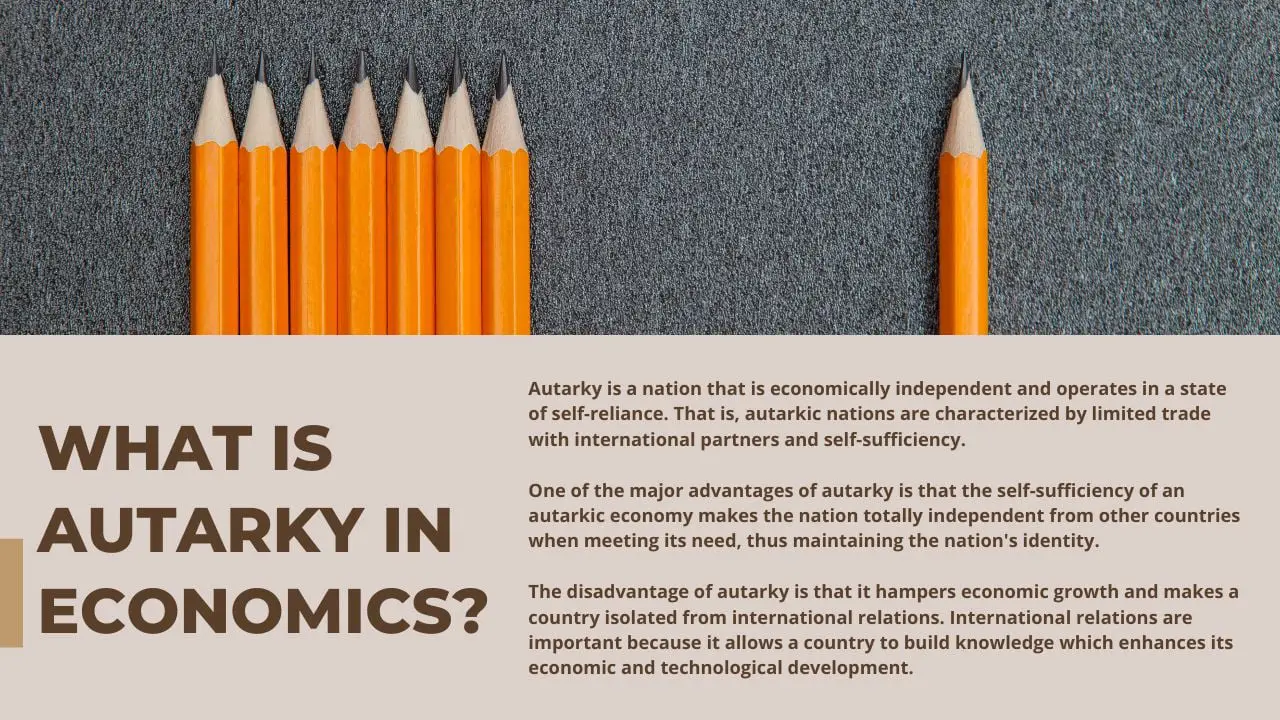Autarky in economics can be thought of as an extreme form of economic protectionism and nationalism. This involves economic independence from other countries wherein a country employs to survive or thrive on its own and grows to a level of self-sufficiency. The concept of autarky in economics may be rare but it is important to understand its details. In this article, we will discuss the autarky definition in economics, its advantages, and disadvantages.
Related: Socialism in Economy (Socialist Economic System)
What is autarky in economics?
Autarky is a nation that is economically independent and operates in a state of self-reliance. That is, autarkic nations are characterized by limited trade with international partners and self-sufficiency. Hence, a fully autarkic nation has a closed economy, no exchange rate, and lacks any form of external support, aid, or trade.

The motivation behind the principle of autarky in economics is the desire of a country to ensure the supply of essential goods in the country and reduce dependency on other countries. A nation may want to reduce dependence on other nations in order to reduce the influence of competing political and economic systems.
See also: Nike’s Supply Chain Issues and Management
Autarky definition in economics
Autarky in economics can be defined as an extreme form of economic protectionism and nationalism. An autarkic economy is the opposite of a liberal economy, that encourages the free flow of goods and services. It is not open to international trade and therefore, doesn’t allow the import and export of goods.
The policy of autarky economics has its roots in Hegelian philosophy. This philosophy views foreign trade as a threat to the overall health and growth of a country and calls for the country to focus on the economic and political forces tied to it. Theoretically, autarky seems achievable but in reality, no modern nation has achieved a full level of autarky.
The fact is, the global supply chain has made economic isolation difficult in a way that autarky is only achievable to a certain level rather than fully (complete economic isolation). As a matter of fact, in today’s modern economy, no country has adopted 100% autarky.
See also: Advantages of Socialist Economy
Examples of autarky in economics
A strong proponent of autarky was Benito Mussolini; the principal founder of fascism in Italy. When Italy’s economy was falling, after World War I, Mussolini declared the goal of Autarky and implemented several socialist measures. The Russian economy before WWI, depended mostly on imports of raw materials and exports of agricultural produce. However, after WWI, the economy was deplorable and new economic policies were put in place.
As an example of autarky in economics, during Mussolini’s reign, there was rapid nationalization of private enterprises; businesses such as shipbuilding, as well as banking and credit were controlled by the government. There was an increase in public debt, the trade deficit widened, and import controls were put in place.
However, despite the new economic policy in force, the Russian economy still required support from the agriculture sector for it to reach the pre-war levels. Hence, Mussolini’s regime led to a fall in the economy’s growth rates and finally led to his fall. Such historical events have led to criticism of the policy of autarky in economics.
Another example of autarky is North Korea. This is an example of an autarkic economy in today’s modern economic system. North Korea adopts the government ideology of Juche (self-reliance), which is centered on the country maintaining its domestic economy in the face of isolation. Nonetheless, this country is not 100% autarky as it has international trade with allied countries like Russia and China.
Autarky is more achievable as a small group rather than as a country or state. That is, it is easier for inland tribes to adopt autarky and shut themselves off from outsiders compared to a whole country isolating itself. Autarky is common in a traditional economy where tribes build a community in a small area and tend to be self-sufficient to meet their daily needs. There are so many examples of such traditional economies around the globe.
Check out: Traditional Economy Advantages
Advantages of autarkic economy
Autarky may not be feasible among countries but it definitely has its advantages. One of the major advantages of autarky in economics is that the self-sufficiency of an autarkic economy makes the nation totally independent from other countries when meeting its need, thus maintaining the nation’s identity.
The self-sufficiency of autarky economics minimizes negative effects like depression and recession from spreading to the domestic economy. Through international trade and capital flows, recessions usually spread to other countries; however, in an autarky economy, such negative effects are avoided because international trade and capital flows are absent.
Due to the economic independence that comes with autarky, a negative supply shock in another country, for instance, can not cause a shortage in an autarkic country’s domestic market since all goods and services are produced domestically. Also, with no international trade, capital flows, and no use of foreign currencies, a currency crisis can not spread to an autarky domestic economy.
Another advantage of autarky in economics is that it brings about independency in economic policy decisions. That is, policymakers in an autarkic economy make policies entirely for domestic interests and do not have to consider other countries when making these policies.
Read about: Disadvantages of Socialist Economy
Disadvantages of autarky economy
There are several disadvantages of autarky in an economy. One of the major disadvantages of the policy of autarky in economics is that it is nearly impossible. The wants and needs of humans are highly diverse and literally impossible to satisfy by only domestic production.
Very few countries are successful at being self-sufficient because international trade is an alternative to meet the demand for some of the products that an economy cannot produce domestically.
Another disadvantage of autarky economics is that its efficiency is low, causing the goods produced to be expensive. In an autarkic economy, there are usually limited factors of production and limited economic resources which causes low efficiency and other issues.
When labor, for instance, is used to produce one good, the labor that is available to produce another good is usually lesser. This means that economies of scale are performed for one good at the expense of another good. Due to this, producing all goods at the most efficient rate becomes impossible.
Also, since the costs of production may be low for certain goods and high for others, the prices for certain goods would be expensive. However, when there is international trade, a country focuses on goods that it has an advantage rather than producing all goods. It can focus on certain goods and import the rest from other countries. This means that when there is no policy of autarky, a country can get some cheap goods from its domestic market and still get other cheap goods from other countries.
A major disadvantage of autarky economics is that it hampers economic growth and makes a country isolated from international relations. International relations are important because it allows a country to build knowledge which enhances its economic and technological development. Technology, for example, spread to different countries via trade and capital investment; technological enhancement in a country facilitates more productive labor and physical capital.
International relations are also important for humanity’s sake and not only for the economy. For instance, in the world today, other countries tend to offer assistance to a country that experiences a social or natural disaster. However, this is only possible when the country is not autarkic or in a closed economy. Hence, an autarkic economy misses out on such foreign aid.
Read also: Which nation has a command economy?
Criticism of autarky economics
The system of autarky in a country has failed several times and as a result, has been considered flawed. Autarkic economy, at times, leads to miss utilization of resources and as such is strongly criticized by most economists. One of the first modern thinkers to question the benefits of autarky economics was Adam Smith, an 18th-century Scottish philosopher considered to be the father of modern economics.
In Adam’s major work, An Inquiry into the Nature and Causes of the Wealth of Nations (1776), he argued that a free-trade system wherein countries specialize in producing the goods that they hold an absolute advantage (because of superior productive capacity) would generate more wealth and that the mercantilist policies that were followed by the British Empire were detrimental to the growth of the economy.
David Ricardo, a 19th-century British economist, considered to be the founder of modern international trade theory, took Smith’s study a step further. David explained that regardless of the size of the economies involved in international trade, there would be guaranteed gains from the trade for all parties if the countries involved engaged in the trade by specializing in the goods in which they held a comparative advantage (because of lower opportunity costs).
After the pioneering works of Adam Smith and David Ricardo, a wide range of theoretical studies were published, establishing the economic superiority of free trade. This, and the rapid globalization of the world economy that came after the end of the Cold War (1991) resulted in autarky losing its appeal as a feasible economic system.
Last Updated on November 2, 2023 by Nansel Nanzip BongdapObotu has 2+years of professional experience in the business and finance sector. Her expertise lies in marketing, economics, finance, biology, and literature. She enjoys writing in these fields to educate and share her wealth of knowledge and experience.
